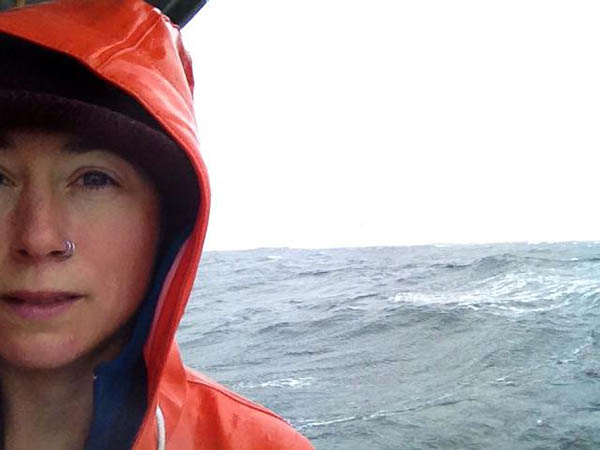Hey friends – if you’ve been following the story of Amanda, our first-time fisherman guest writer, you may be as eager for her latest update as I’ve been. The frenzied life of a tender deckhand hasn’t allowed much land time (and even less internet access), so I was thrilled to find this post in my inbox. If you’re a new visitor, please do catch up on her pre-season anticipation and her first check-in; she’s got a wonderful story. Be well — T
Thursday, August 2, 2012
I’m taking it all in. We’ve been tendering for over a month now, running out to the fishing grounds, buying and unloading fish from both gill-net fishermen and seine-net fishermen. We are finally being sent to tend to the trollers.
For too many reasons to list, troll tendering is much preferred by the Nichawak’s skipper. I’ve gathered that the main difference between troll tending and tending to net fishermen is the way the fish are handled. Gillnet fishermen unload thousands of pounds from their boats at once, seiners unload tens of thousands. Too many fish to sort, these fish immediately get dumped in the Nichawak “fish hold,” which can contain up to 160,000 pounds of fish when full.
Because they use line instead of net, the trollers don’t catch as many pounds of fish at one time. When buying troll fish, we will touch every fish; first gutted and cleaned by the trollers, we sort them by weight and quality and carefully place them in totes of “slush.” I am anticipating being more connected with the work and feel excited about that. Tonight we head South, down Frederick Sound, through Chatham Strait, and to the Southwest coast of Baranof Island, the open ocean.
This fishing world is like an observer’s playground. It seems that every time I form an opinion about something, it is soon challenged with new information and I am wondering that perhaps it is only after experience that we become entitled to our opinions. Observation is my ally.
I’ve struggled with all the anticipated obstacles, the unpredictable schedule, the endless pounds of bloody fish, the close quarters I share with the crew, the occasional communication breakdowns. More than once I’ve stared at a crew member after recieving an instruction and thought to myself, “They just said English words, why didn’t I understand?!”
But I’ve come to learn what it means to “haul the anchor,” “hook up a Treko to the rigging,” “tie up to pilings,” “get the galley sea-worthy,” and “ice up.” I’m in love with the nautical language and the novelty of the VHF radio is still at large. I giggle at every opportunity to use it and my favorite things to say are “Roger that!” and “Standing by on channel 16 and channel 11!”
I’ve also come to realize that I am not a very serious person, most that know me would probably agree, and there are many, many things about this job that make it very serious work. This has been a struggle. I’m learning to adapt my sense of humor to a fishing/boating/equipment context; I boast a spot-on impression of a hydraulic crane.
Though we’ve had, will continue to have, our grouchy moments and shared frustrations, the Nichawak crew laughs a lot. I treasure them for their unwavering work ethic, their humility, and their patience. They are “Gerald,” the deckhand/engineer, and the skippper, “Sal” (and I disclose with affection that they chose their own pseudonyms.) In contrast to myself, Gerald is a serious soul and forever gracious, remarking “I feel nourished” upon finishing a dinner that I had labored over after a long work day. Sal, who is well known and respected among the Southeast fishing community, has integrity worth speaking of and is always good-natured.
They’ve been great company, but I often find myself wishing for the perspective and insights of other women. This wish grew into desperation after a particularly difficult experience, which at first horrified me. It has since left me confused and seeking someone to relate (bless them, Gerald and Sal didn’t have much to say to console me). I’d like to share it now, if only because humans have hard feelings, and that’s what’s relatable.
Ratchet straps are long, heavy straps that we use to immobilize thousands of pounds of equipment on deck while we are “underway” (traveling). I am barely literate enough in equipment language to describe them. They work by cranking a handle up and down, this turns a wheel and coils the strap, creating tension and eliminating excess slack. Ratchet straps are heavy, they are old and rusty, and they are too damn big for my little hands. At first, using them was funny, I would refuse all help offered by the crew and stubbornly demand that they “let me figure it out!”
One day, we were abruptly informed by the processing plant that we needed to get underway immediately. Sal starts up the engines and Gerald and I rush out to begin our routine deck chores. One of these chores is tightening the ratchet straps over dozens of plastic totes full of ice, weighing about 700 pounds apiece. I go to work on the straps, cursing and sweating and pleading, taking twice as long as I should be. Urgency is building and I feel pathetic, Gerald is moving swiftly around me doing more than his share of the work and whether or not it is true, I am sure Sal is watching me from the wheel house wondering why I can’t manage such a simple task. At this time of frustration I think to myself these exact words, “Damn, this is so emasculating!”
Emasculating. But, I’m a woman! A feminist even, by some definition. I finally finished with the ratchet straps (or at least just the one) but I was shocked with myself. I thought I was proud and empowered by my gender and I couldn’t believe I would so instinctively let such a trivial frustration affect how I perceive my gender. Suffice it to say, this feeling led me to a series of other difficult emotions, including but not limited to shame, guilt, and embarrassment.
In further reflection of this experience, all I can come up with is that I am a product of my culture and our constructed gender roles. But in all sincerity, I feel jolted and would like nothing more than to sit down with one of my friends, Anna, Elizabeth, Lily, any strong, capable, independent woman really, and talk it out, gather whatever wisdom they have to shed.
So, I asked for challenges and I am getting them in all forms. To conclude, I will remind myself here of what I am reminded of every day: I’m grateful for this experience, grateful for opportunity, humbled by what I’ve learned and what I have yet to learn.
Thanks for reading!
Amanda




Don’t worry, it’s only a word. Let go of the shame and guilt. You can try to find the translation into non-gendered language, but in the end, it’s the word that came most quickly to your brain in a time of stress. Pretty funny when you dig in.
Amanda,
Be gentle on yourself! Wouldn’t the growing pains you experienced with the ratcheting chore been the same for a man? if it had to do with lack of experience, then the issue is not about gender. if it had to do with upper body strength, most men have an advantage due to physiology. From my experience, as a woman working on trollers, I think sometimes it is okay to accept help (you received unsolicited help on the ratcheting chore — which was for the common good) . As you know, in working on boats, speed (AND safety) is often of the essence and it just makes sense to work with others in a way that is the most efficient. You may not have speed (yet:) on ratcheting but have other talents and strengths to contribute such as your ability to provide a noursihing meal . Using a basketball analogy, maybe when it comes to deck work you are more of a point guard than a power forward! You are a valuable team member! Keep perspective 🙂
As someone who grew up longlining and trolling, I never had the lovely experience of working with the ratchet straps until I got married and started crabbing and seining. I also got extremely frustrated with myself for not being able to do it..it will get easier 🙂 and if it doesn’t just think of all the amazing things you CAN do
A fun read, Amanda. Keep up the good work!
Amanda,
The geese have started to fly South. The nights are getting noticeably shorter. Can you feel it? The change? There is something…not quite discernable…in the air. The fishermen, maybe not all but most, are starting to think about the upcoming hunting season. Every so often, there is a hint of woodsmoke in the air. It is still early though. The trollers are working on the Kings, still, as the quota has not been caught yet. It feels like the season will go on forever. It won’t though. These are the days where the tender becomes more like a connection to home. The fishermen are tired. So are you. End the season well!
Amanda, I hate those straps… and it is because our hands are smaller and they are rusty and cumbersome and difficult! Your story, your reaction and your thoughts on our culture and gender remind me of when I lived in NYC and was training for a bike ride across Minnesota. One day while riding in Central Park I was gaining on a runner with a long blond ponytail. I thought, “She has the perfect body.” As I passed I quickly looked over my shoulder at her and she had a nicely trimmed beard. Her perfect body with slender hips and long lean thighs was a young man’s body. I had the same reaction to myself — WTF? Could it be that as I walked the city the enormous advertisements with stick thin models towering over me were insidiously brain washing me?? I still struggle to love my round softness, but I’ve figured out those damn straps and you will too. Looking forward to seeing you in person!!